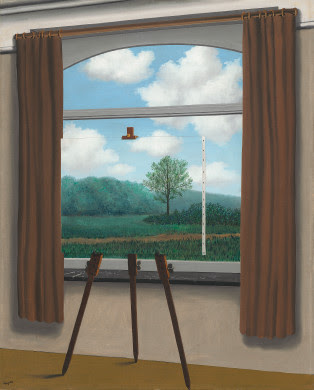Rene Magritte, "La Condition Humaine" (1933)
The Human Condition
In this motel where I was told to wait,
The television screen is stood before
The picture window. Nothing could be more
Use to a man than knowing where he's at,
And I don't know, but pace the day in doubt
Between my looking in and looking out.
Through snow, along the snowy road, cars pass
Going both ways, and pass behind the screen
Where heads of heroes sometimes can be seen
And sometimes cars, that speed across the glass.
Once I saw world and thought exactly meet,
But only in a picture by Magritte.
A picture of a picture, by Magritte,
Wherein a landscape on an easel stands
Before a window opening on a land-
scape, and the pair of them a perfect fit,
Silent and mad. You know right off, the room
Before that scene was always an empty room.
And that is now the room in which I stand
Waiting, or walk, and sometimes try to sleep.
The day falls into darkness while I keep
The TV going; headlights blaze behind
Its legendary traffic, love and hate,
In this motel where I was told to wait.
Howard Nemerov, The Blue Swallows (1967).
Adam Bruce Thomson, "Still Life at a Window" (c. 1944)
Now, having just warned myself about (1) being too highfalutin' and (2) the dangers of bringing philosophy to bear in the reading of a poem, I would like to offer a few thoughts from the ever-lovable (and, alas, usually accurate) Arthur Schopenhauer:
"[T]he same external events and circumstances affect each of us quite differently; and indeed with the same environment each lives in a world of his own. For a man is directly concerned only with his own conceptions, feelings, and voluntary movements; things outside influence him only in so far as they give rise to these. The world in which each lives depends first on his interpretation thereof and therefore proves to be different to different men. Accordingly, it will result in being poor, shallow, and superficial, or rich, interesting, and full of meaning."
Arthur Schopenhauer (translated by E. F. J. Payne) , Parerga and Paralipomena, Volume 1 (1851), page 316.
Having dug myself into this hole, I'm afraid that I'm going to dig deeper by letting Ludwig Wittgenstein have the final word:
"The world of the happy man is a different one from that of the unhappy man."
Ludwig Wittgenstein (translated by D. F. Pears and B. F. McGuinness), Tractatus Logico-Philosophicus, from Proposition 6.43 (1921).
William Bernard Adeney (1878-1966)
"The Window"






4 comments:
And I suppose from that Wittgenstein comment one could leap to the opening phrases of Anna Karenina.
zmkc: ah, nice thought. So: happy men/women are all alike, but unhappy men/women are each unhappy in their own way -- something to think about. I need to ponder that one!
It's good to hear from you again. I always appreciate your visits and thoughts.
Hi - just wanted to say have just discovered your blog, and find the poetry and art really enchanting! Have bookmarked you :-)
Jo: thank you very much for your kind words. I'm pleased that you found your way here, and I hope you'll return. Thanks again.
Post a Comment